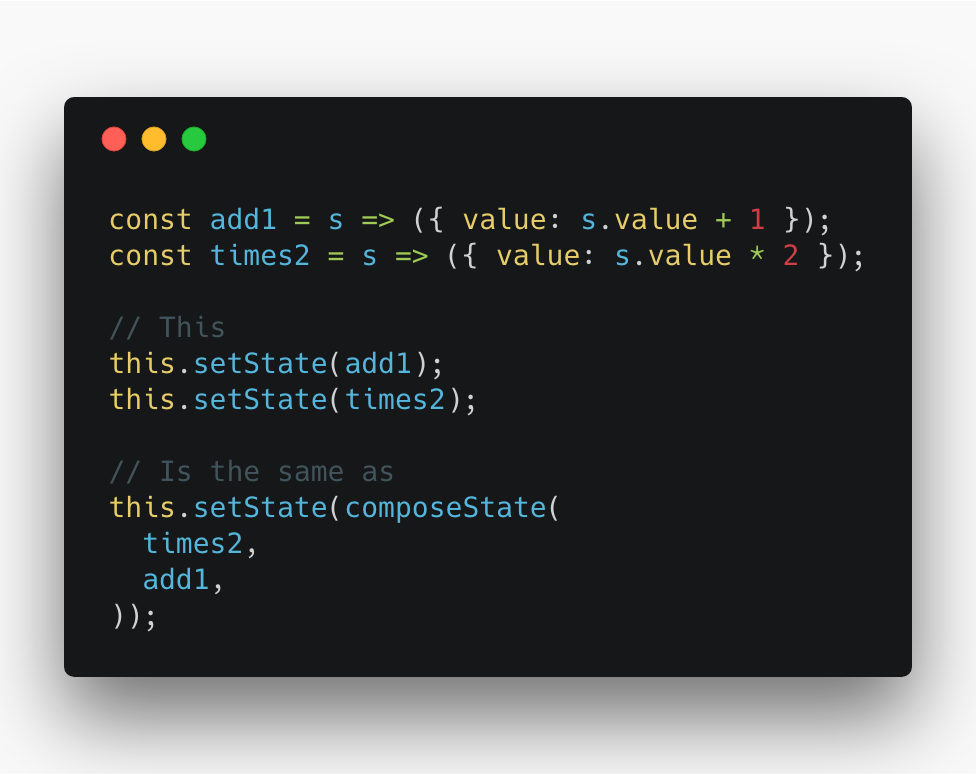tvler / Compose State
Programming Languages
Projects that are alternatives of or similar to Compose State
✍️ compose-state
compose-state is a library that composes multiple state updaters in React.

compose-state works with the standard setState parameters – objects or functions – so you don’t have to learn any new syntax. It’s also compatible with React’s new getDerivedStateFromProps lifecycle method.
Use
Install
yarn add compose-state or npm install compose-state
Import
import composeState from 'compose-state';
// or
import {
composeState,
composeDerivedStateFromProps,
} from 'compose-state';
API
composeState([updaters])
Returns an updater that can be used with setState. Calling this produces the same result as calling or accessing each given updater from right to left, merging each partial state. If a given updater is a function, its prevState value is the previous state merged with the current partial state.
Arguments
| Name | Type | Description |
|---|---|---|
[updaters] |
(...Updater) |
Functions that can be used with setState, or partial state objects |
composeDerivedStateFromProps([updaters])
Returns an updater that can be set as a component's getDerivedStateFromProps static value. Calling this produces the same result as calling or accessing each given updater from right to left, merging each partial state. If a given updater is a function, its prevState value is the previous state merged with the current partial state.
Arguments
| Name | Type | Description |
|---|---|---|
[updaters] |
(...Updater) |
Functions that can be set as a component's getDerivedStateFromProps static value, or partial state objects |
Benefits
Simplify your updaters and React code
Let's say you want to call setState and do two things
- Increment a score value by 1
- Log the current time to an array
Both of these updaters need to be functional, since they rely on the previous state for their return values.
const updateScore = s => ({ score: s.score + 1 });
const logTime = s => ({ log: [...s.log, Date.now()] });
Normally, we would need to call setState for both of these functions
class Game extends Component {
onScore = () => {
this.setState(updateScore);
this.setState(logTime);
};
// ...
}
...or we rewrite the two updaters into one larger function.
const updateScoreLogTime = s => ({
score: s.score + 1,
log: [...s.log, Date.now()],
});
But with compose-state, we can keep these two updaters independent, and we won't have to bulk up our component code with more setState calls.
const updateScoreLogTime = composeState(updateScore, logTime);
class Game extends Component {
onScore = () => {
this.setState(updateScoreLogTime);
};
// ...
}
compose-state isn't dependent on React at all, it's just a big reducer function. This allows you to build and compose as many updaters as you want while keeping your actual component code simple and maintainable.
Easily mix functional and object updaters
compose-state accepts both objects and functions, just like setState. This allows you to mix static and dynamic updaters without increasing the complexity of any individual parameter.
const defaultValue = { value: 0 };
const incrementOther = s => ({ other: s.other + 1 });
this.setState(
composeState(defaultValue, incrementOther)
);
Compatibility with getDerivedStateFromProps
compose-state comes with a composeDerivedStateFromProps function to use with React's new getDerivedStateFromProps lifecycle method.
const updater1 = (nextProps, prevState) => {
// ...
}
const updater2 = (nextProps, prevState) => {
// ...
}
class App extends Component {
static getDerivedStateFromProps = composeDerivedStateFromProps(
updater1, updater2
)
// ...
}
It's just normal, boring React
While more formal state managers push developers away from controlling state in React, compose-state simply enhances state control methods that are primitive to the platform.
compose-state is a lot like Classnames. It's a helper function that makes setState calls more declarative and easier to construct, just like how Classnames is a helper function that makes className values more declarative and easier to construct.
Further reading
Functional setState is the future of React by Justice Mba
Best kept React secret: you can declare state changes separately from the component classes. by Dan Abramov
